

Fantastic. The fantastic is a subgenre of literary works characterized by the ambiguous presentation of seemingly supernatural forces.
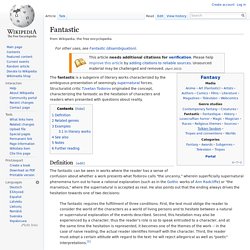
Structuralist critic Tzvetan Todorov originated the concept, characterizing the fantastic as the hesitation of characters and readers when presented with questions about reality. Definition[edit] The fantastic can be seen in works where the reader has a sense of confusion about whether a work presents what Todorov calls "the uncanny," wherein superficially supernatural phenomena turn out to have a rational explanation (such as in the Gothic works of Ann Radcliffe) or "the marvelous," where the supernatural is accepted as real. He also points out that the ending always drives the hesitation towards one of two decisions: Kant's View of the Mind and Consciousness of Self. 1.
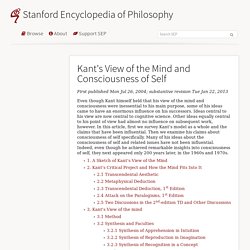
A Sketch of Kant's View of the Mind In this article, we will focus on Immanuel Kant's (1724–1804) work on the mind and consciousness of self and related issues. Some commentators believe that Kant's views on the mind are dependent on his idealism (he called it transcendental idealism). For the most part, that is not so. At worst, most of what he said about the mind and consciousness can be detached from his idealism. In general structure, Kant's model of the mind was the dominant model in the empirical psychology that flowed from his work and then again, after a hiatus during which behaviourism reigned supreme (roughly 1910 to 1965), toward the end of the 20th century, especially in cognitive science.
Three ideas define the basic shape (‘cognitive architecture’) of Kant's model and one its dominant method. Hume and Kant: Contrasting Models of the Self. Hume and Kant: Contrasting Models of the Self Powereality Search Engine Custom Search By David Nollmeyer Two of the most influential philosophers on psychology have been David Hume and Immanuel Kant (Boeree 1999).
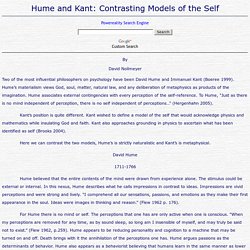
Kant’s position is quite different. Being and Nothingness. Being and Nothingness: An Essay on Phenomenological Ontology (French: L'Être et le néant : Essai d'ontologie phénoménologique), sometimes subtitled A Phenomenological Essay on Ontology, is a 1943 book by philosopher Jean-Paul Sartre.[1] Sartre's main purpose is to assert the individual's existence as prior to the individual's essence.
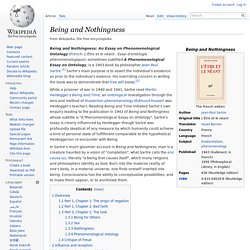
His overriding concern in writing the book was to demonstrate that free will exists.[2] In Sartre's much gloomier account in Being and Nothingness, man is a creature haunted by a vision of "completion", what Sartre calls the ens causa sui, literally "a being that causes itself", which many religions and philosophers identify as God. Born into the material reality of one's body, in a material universe, one finds oneself inserted into being. Consciousness has the ability to conceptualize possibilities, and to make them appear, or to annihilate them.
Overview[edit] The Uncanny and the Fantastic. The Uncanny and the Fantastic The German word "unheimlich" is considered untranslatable; our rough English equivalent, "uncanny", is itself difficult to define.
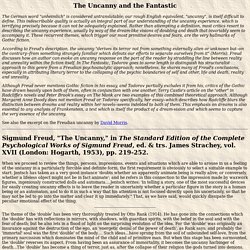
This indescribable quality is actually an integral part of our understanding of the uncanny experience, which is terrifying precisely because it can not be adequately explained. Rather than attempting a definition, most critics resort to describing the uncanny experience, usually by way of the dream-like visions of doubling and death that invariably seem to accompany it. These recurrent themes, which trigger our most primitive desires and fears, are the very hallmarks of Gothic fiction. According to Freud's description, the uncanny "derives its terror not from something externally alien or unknown but--on the contrary--from something strangely familiar which defeats our efforts to separate ourselves from it" (Morris). See also the excerpt on the Freudian uncanny by David Morris. ... La madre ourobórica, la sombra y los relatos de terror.
“...la necesidad no es una idea, no hay ideas necesarias sino una evidencia, si hay evidencias necesarias las ideas pueden ser engañosas pero el hambre, el dolor, el miedo, la lujuria, jamás lo son...
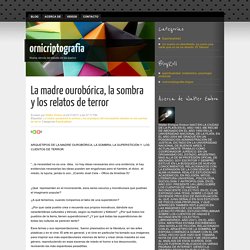
(Camilo José Cela – Oficio de tinieblas 5)” ¿Qué representan en el inconsciente, esos seres oscuros y monstruosos que pueblan el imaginario popular? ¿A qué tememos, cuando rompemos el tabú de una superstición? ¿Por qué cada pueblo crea o recuerda sus propios monstruos, dándole sus características culturales y étnicas, según su tradición y folklore?
Faust. Un article de Wikipédia, l'encyclopédie libre.
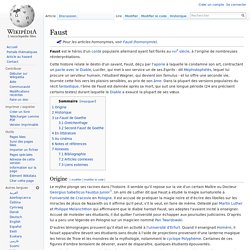
Faust est le héros d'un conte populaire allemand ayant fait florès au XVIe siècle, à l'origine de nombreuses réinterprétations. Cette histoire relate le destin d'un savant, Faust, déçu par l'aporie à laquelle le condamne son art, contractant un pacte avec le Diable, Lucifer, qui met à son service un de ses Esprits - dit Méphistophélès, lequel lui procure un serviteur humain, l'étudiant Wagner, qui devient son famulus - et lui offre une seconde vie, tournée cette fois vers les plaisirs sensibles, au prix de son âme.
Dans la plupart des versions populaires du récit fantastique, l’âme de Faust est damnée après sa mort, qui suit une longue période (24 ans précisent certains textes) durant laquelle le Diable a exaucé la plupart de ses vœux. Origine[modifier | modifier le code] Le mythe plonge ses racines dans l'histoire. D'autres témoignages prouvent qu'il était en activité à l’université d’Erfurt. La mort de Faust se situe en 1537 ou 1538[2]. Consciousness. 1.
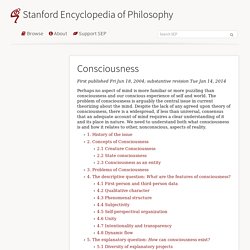
History of the issue Questions about the nature of conscious awareness have likely been asked for as long as there have been humans. Neolithic burial practices appear to express spiritual beliefs and provide early evidence for at least minimally reflective thought about the nature of human consciousness (Pearson 1999, Clark and Riel-Salvatore 2001). Preliterate cultures have similarly been found invariably to embrace some form of spiritual or at least animist view that indicates a degree of reflection about the nature of conscious awareness.
Nonetheless, some have argued that consciousness as we know it today is a relatively recent historical development that arose sometime after the Homeric era (Jaynes 1974).